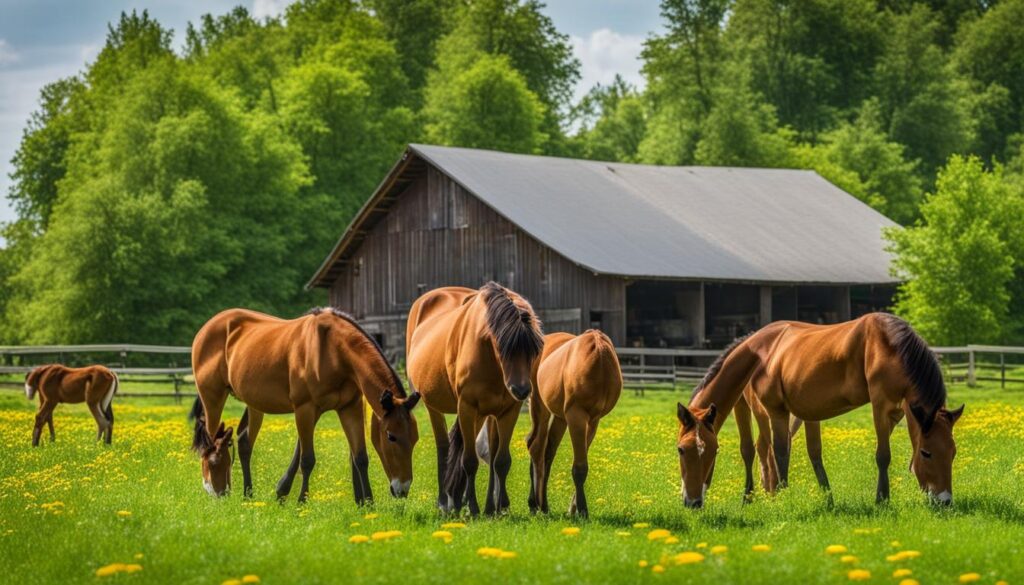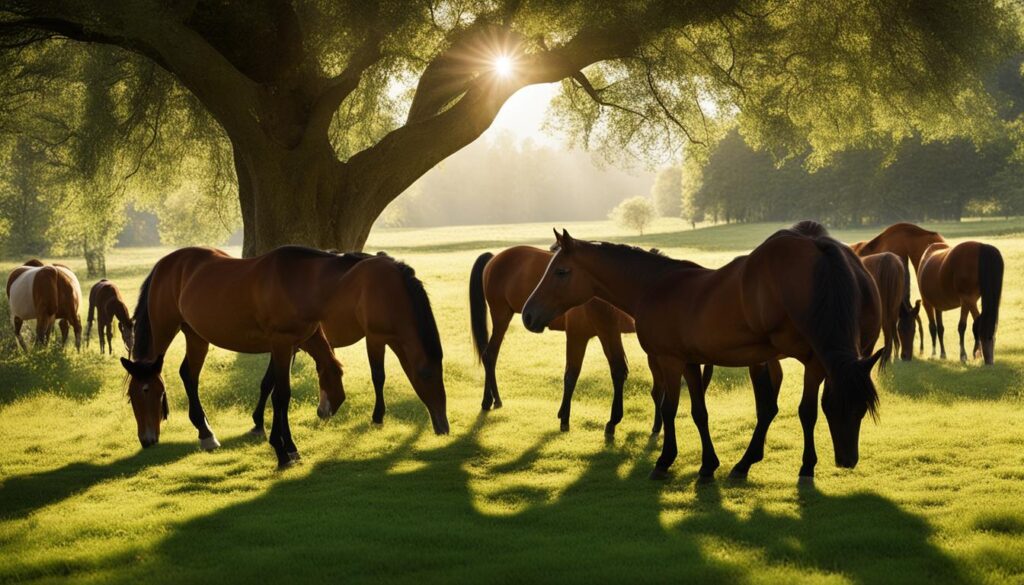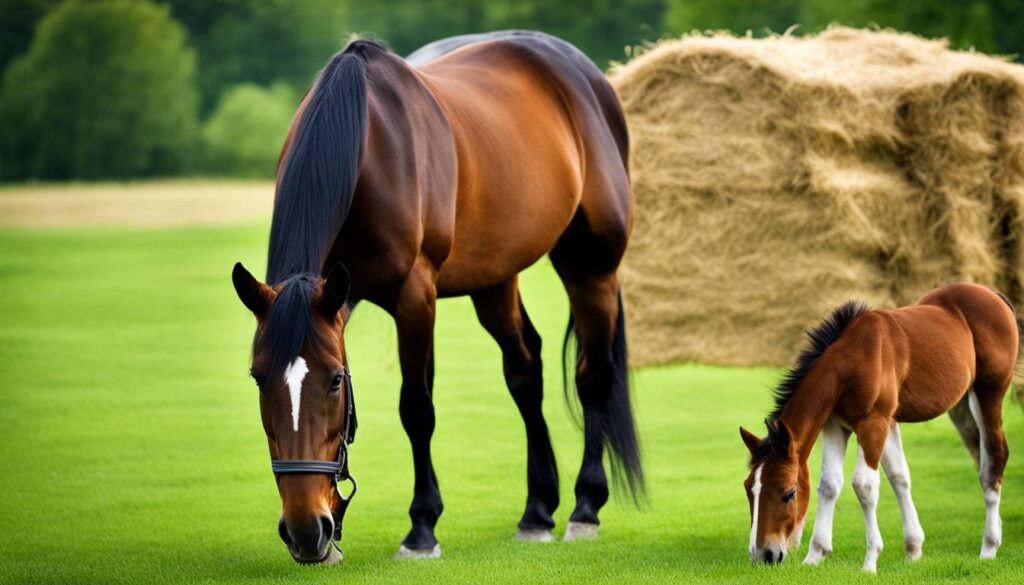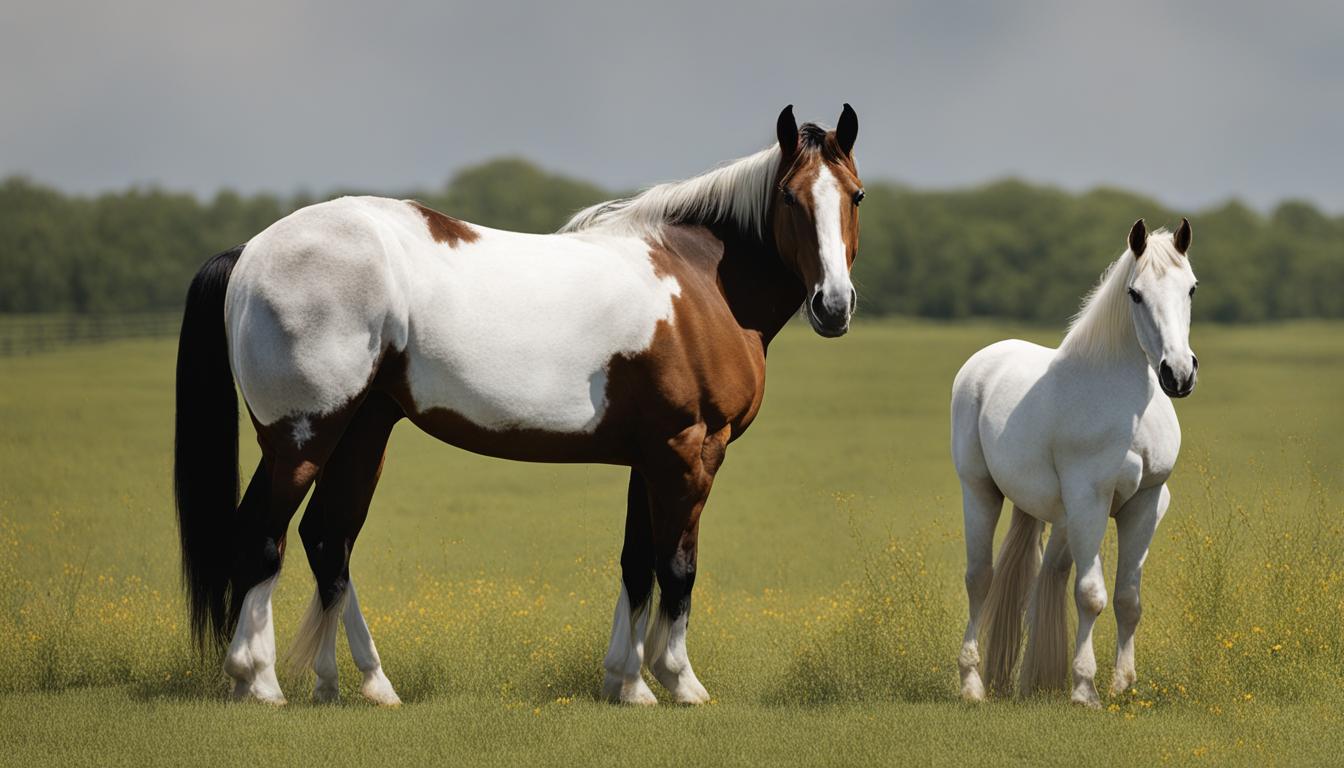Nurturing Growth: Balancing Nutrients for Young and Aging Horses
Proper equine nutrition is essential for the overall health and well-being of young and aging horses. Whether you have a playful foal or a wise old companion, maintaining a balanced diet is key to their vitality and longevity. In this article, we will explore the importance of dietary balance, horse feeding, and the impact of nutrition on growth and development.
Key Takeaways:
- Equine nutrition is crucial for both young and aging horses.
- A balanced diet supports optimal growth and development in young horses.
- Proper nutrition promotes health and vitality in aging horses.
- For young horses, transitioning from milk to forage should be gradual.
- Consulting with an equine nutritionist or veterinarian helps ensure optimal nutrition for your horse.
Weaning Season Nutrition for Foals and Mares
Weaning is a critical time in a foal’s life when their nutritional needs change. While the mare’s milk provides essential nutrients for the first few months, additional nutrients from forage, such as grass, become important as the foal grows.
The transition from milk to forage should be gradual to minimize stress on the foal. Providing a balanced diet with adequate nutrients is crucial for the foal’s growth and development during this stage.
Importance of Weaning Season Nutrition
“The weaning season is a significant milestone in a foal’s life, requiring careful attention to their nutritional requirements. It marks the transition from solely relying on mare’s milk to gradually introducing forage and other essential nutrients.”
During the weaning season, foals need to adapt to consuming solid food alongside their mother’s milk. This transition period is crucial for their digestive system to adjust and for them to develop proper chewing and foraging habits.
Forage, such as grass, plays a vital role in providing necessary energy, vitamins, and minerals to support the foal’s growth and development. It complements the mare’s milk, gradually becoming the primary source of nutrition as the foal matures.
Nutritional Recommendations for Weaning Foals and Mares
When weaning foals and mares, it is important to:
- Introduce small quantities of forage gradually, such as high-quality grass, to minimize digestive upset and stress.
- Monitor the foal’s weight and body condition to ensure proper growth and development.
- Provide a balanced diet that meets their nutritional requirements, including protein, vitamins, and minerals.

Table: Nutritional Recommendations for Weaning Foals and Mares
| Age | Feeding Guidelines |
|---|---|
| 3-4 months | – Continue nursing from the mare – Introduce small amounts of high-quality grass or forage |
| 4-5 months | – Reduce mare’s milk gradually – Increase forage intake – Monitor body condition and adjust feed accordingly |
| 5-6 months | – Minimize mare’s milk – Provide adequate forage and nutritionally balanced concentrate feeds – Regularly monitor weight and development |
Proper nutrition during the weaning season is vital for the foal’s overall health, growth, and future performance. Consult with an equine nutritionist or veterinarian to design an appropriate diet plan tailored to your foal’s specific needs.
Feeding Young Horses: From Weaning to Two-Year-Old
Feeding young horses is a critical aspect of their growth and development, especially from the time of weaning until they reach two years of age. During this crucial period, it is important to provide them with a balanced diet that meets their nutritional needs and promotes optimal development.
A key component of their diet should be high-quality forage, which serves as a valuable source of essential nutrients. Forage, such as pasture grass or hay, not only provides young horses with the necessary fiber but also contributes to their overall well-being.
“Feeding young horses a diet rich in forage helps support healthy digestion, provides essential nutrients, and promotes proper growth and development,” says Dr. Sarah Johnson, renowned equine nutritionist.
In addition to forage, young horses also benefit from nutritionally balanced concentrate feeds. These feeds are specifically formulated to provide the necessary protein, energy, minerals, and vitamins that young horses require for their overall health and skeletal development.
However, it’s important to note that the amount of concentrate feed should be carefully regulated to avoid overfeeding. Young horses have unique nutritional requirements that can differ based on their breed, size, and activity level. Consulting with an equine nutritionist or veterinarian can help determine the appropriate feeding amounts based on individual needs.
Proper nutrition during this critical growth stage not only supports their physical development but also plays a significant role in their future performance. A well-balanced diet during these formative years sets a solid foundation for their overall health and athletic potential.
Recommended Feeding Guidelines:
| Age | Forage | Concentrate Feed |
|---|---|---|
| Weanling | Free-choice quality hay or pasture grass | Up to 1 lb per 100 lbs body weight* |
| Yearling | Free-choice quality hay or pasture grass | Up to 0.5 lb per 100 lbs body weight* |
| Two-Year-Old | Free-choice quality hay or pasture grass | Up to 0.25 lb per 100 lbs body weight* |
*Feeding amounts may vary based on individual horse’s needs. Consult with an equine nutritionist or veterinarian for personalized recommendations.

By providing young horses with a balanced diet that includes high-quality forage and nutritionally balanced concentrate feeds, you are giving them the best chance for healthy growth, optimal development, and future success.
The Impact of Nutrition on Growth and Development
Nutrition plays a significant role in the growth and development of young horses. While genetics, management, and environment also influence growth rates, proper nutrition can support healthy growth and reduce the risk of developmental disorders. Balancing protein, minerals, and other essential nutrients, as well as providing appropriate exercise and turnout, are important factors in promoting optimal growth and musculoskeletal health in young horses.
When it comes to genetics, each horse is born with a unique set of genes that determine its growth potential. However, the right nutrition can help unlock that potential and maximize growth rates. By providing a balanced diet rich in essential nutrients, such as protein and minerals, you can support the development of strong bones, muscles, and organs.
Developmental disorders, such as Developmental Orthopedic Disease (DOD), can hinder a young horse’s growth and performance. These disorders can be caused by various factors, including rapid growth, imbalanced nutrition, and certain genetic predispositions. By ensuring a balanced diet and appropriate exercise, you can reduce the risk of these disorders and promote healthy development.
Protein is an essential nutrient for growth and repair in young horses. It provides the building blocks for muscle development and supports the growth of strong bones and connective tissues. Including high-quality protein sources, such as legumes or fish meal, in the diet can ensure that young horses receive an adequate amount of this vital nutrient.
Minerals are also crucial for proper growth and development. Calcium and phosphorus, for example, are necessary for bone formation, while zinc and copper support overall skeletal health. Providing a well-balanced mineral supplement or choosing feeds that are fortified with these minerals can help meet the specific nutritional needs of growing horses.
Exercise and turnout play a vital role in a young horse’s overall development. Regular exercise not only strengthens muscles and bones but also promotes cardiovascular health and mental well-being. Allowing young horses to have access to ample turnout time enables them to engage in natural movement and grazing behaviors, which further supports their physical development.
“Proper nutrition is like the foundation of a house – without it, the structure will not be strong. By providing the right balance of nutrients and allowing for regular exercise, you can set your young horse up for a lifetime of soundness and success in their chosen discipline.” – Dr. Emily Jones, Equine Nutritionist

Conclusion
Nurturing the growth of young horses and ensuring the health of aging horses through proper equine nutrition and dietary balance is crucial for their overall well-being. Your horse’s diet should consist of high-quality forage, such as grass or hay, as well as nutritionally balanced concentrate feeds. It is important to provide the right levels of protein, minerals, and vitamins to support their physical development and immune system.
Regular monitoring of your horse’s diet and making necessary adjustments is essential to meet their changing nutritional needs. In addition to a balanced diet, ensure that your horse gets adequate exercise and turnout, as physical activity is crucial for their overall health and muscle development.
To ensure your horse receives optimal nutrition, it is highly recommended to consult with an equine nutritionist or veterinarian. They can provide expert guidance tailored to your horse’s specific needs, taking into account their age, breed, activity level, and any underlying health conditions. By prioritizing equine nutrition, you will contribute to the healthy development and longevity of your horse at every stage of their life.
FAQ
Why is nutrition important for young and aging horses?
Nutrition is crucial for the overall health and well-being of young and aging horses. It supports growth and development in young horses and helps maintain health and vitality in aging horses.
What nutritional changes occur during the weaning season for foals and mares?
During weaning, a foal’s nutritional needs change. While the mare’s milk provides essential nutrients for the first few months, additional nutrients from forage, such as grass, become important as the foal grows. The transition from milk to forage should be gradual to minimize stress on the foal.
What should I feed young horses from weaning to two years of age?
Feeding young horses during this period requires a balanced diet. It should include high-quality forage and nutritionally balanced concentrate feeds. Ensuring adequate protein, energy, minerals, and vitamins is essential to support their growth, development, and future performance.
How does nutrition impact the growth and development of young horses?
Nutrition plays a significant role in the growth and development of young horses. While genetics, management, and environment also influence growth rates, proper nutrition supports healthy growth and reduces the risk of developmental disorders. Balancing protein, minerals, and other essential nutrients, along with appropriate exercise and turnout, promotes optimal growth and musculoskeletal health.
Why is a balanced diet important for the overall health of horses?
Nurturing the growth of young horses and ensuring the health of aging horses through proper nutrition and dietary balance is crucial for their overall well-being. By providing a balanced diet that includes high-quality forage, nutritionally balanced concentrate feeds, and appropriate levels of protein, minerals, and vitamins, horses can maintain their health, longevity, and vitality.
How can I ensure my horse receives optimal nutrition?
Regular monitoring and adjusting of their diet, along with proper exercise and turnout, contribute to the healthy development and longevity of horses at all stages of life. Consulting with an equine nutritionist or veterinarian can help ensure that horses receive the best nutritional plan tailored to their specific needs.

